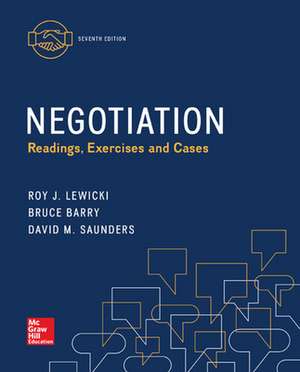Negotiation: Readings, Exercises, and Cases
Autor Roy Lewicki, Bruce Barry, David Saundersen Limba Engleză Paperback – 16 oct 2014
Negotiation is a critical skill needed for effective management. Negotiation: Readings, Exercises, and Cases 7e by Roy J. Lewicki, Bruce Barry, and David M. Saunders takes an experiential approach and explores the major concepts and theories of the psychology of bargaining and negotiation and the dynamics of interpersonal and inter-group conflict and its resolution. It is relevant to a broad spectrum of management students, not only human resource management or industrial relations candidates. The Readings portion of the book is ordered into seven sections: (1) Negotiation Fundamentals, (2) Negotiation Subprocesses, (3) Negotiation Contexts, (4) Individual Differences, (5) Negotiation across Cultures, (6) Resolving Differences, and (7) Summary. The next section of the book presents a collection of role-play exercises, cases, and self-assessment questionnaires that can be used to teach negotiation processes and subprocesses.
Preț: 1009.64 lei
Preț vechi: 1231.26 lei
-18% Nou
Puncte Express: 1514
Preț estimativ în valută:
193.22€ • 199.61$ • 160.81£
193.22€ • 199.61$ • 160.81£
Carte disponibilă
Livrare economică 04-18 martie
Preluare comenzi: 021 569.72.76
Specificații
ISBN-13: 9780077862428
ISBN-10: 0077862422
Pagini: 736
Dimensiuni: 185 x 231 x 38 mm
Greutate: 1.27 kg
Ediția:7
Editura: McGraw Hill Education
Colecția McGraw-Hill
Locul publicării:United States
ISBN-10: 0077862422
Pagini: 736
Dimensiuni: 185 x 231 x 38 mm
Greutate: 1.27 kg
Ediția:7
Editura: McGraw Hill Education
Colecția McGraw-Hill
Locul publicării:United States









